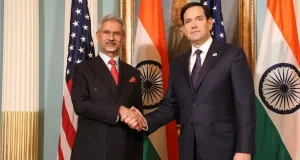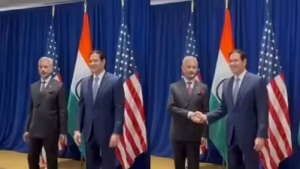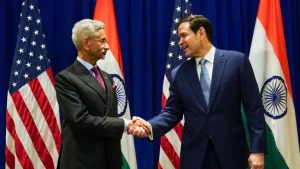Washington D.C. – US Secretary of State Marco Rubio met with External Affairs Minister Dr S Jaishankar in a significant diplomatic encounter that reaffirmed India’s strategic value to the United States. The high-profile Rubio Jaishankar meeting took place on Monday at the Lotte New York Palace Hotel on the sidelines of the 80th United Nations General Assembly, addressing critical bilateral issues amid ongoing tensions over trade, tariffs, and H-1B visa policies.
The Rubio Jaishankar meeting occurred against a backdrop of strained India-US relations, with recent disputes over tariffs, trade policies, and the controversial H-1B visa fee increase creating diplomatic challenges. Despite these tensions, Rubio’s statements following their discussions emphasized the enduring importance of the bilateral partnership.
Strategic Importance Declaration Amid Ongoing Disputes


Following the Rubio Jaishankar meeting, the US Secretary of State issued a strong statement reiterating that India continues to be a “critical” partner for Washington. In the official readout from the meeting, Rubio specifically stated that ties with New Delhi are of “critical importance” to the United States, signaling diplomatic efforts to maintain strategic cooperation despite recent disagreements.
The Rubio Jaishankar meeting’s emphasis on India’s critical importance comes at a crucial time when bilateral relations face multiple challenges. The Trump administration’s recent policy decisions, including increased tariffs and H-1B visa restrictions, have created uncertainty about the future of India-US economic cooperation, making such diplomatic reassurances particularly significant.
Comprehensive Bilateral Agenda Discussion

According to the US State Department, the Rubio Jaishankar meeting focused on various aspects of India-US bilateral ties, covering trade, defense, energy, pharmaceuticals, and critical minerals. This comprehensive agenda demonstrates both countries’ commitment to maintaining dialogue across multiple sectors despite ongoing disagreements in specific areas.
The Rubio Jaishankar meeting’s broad scope reflects the complexity of modern India-US relations, where cooperation in strategic sectors like defense and critical minerals coexists with disputes over trade policies and immigration restrictions. Both leaders appeared committed to addressing these multifaceted challenges through sustained engagement.
Jaishankar’s Response and Future Engagement Commitment
External Affairs Minister Jaishankar’s response to the Rubio Jaishankar meeting emphasized the productive nature of their discussions. Taking to social media platform X, Jaishankar stated that the meeting “covered a range of bilateral and international issues of current concern,” indicating the breadth of topics addressed during their diplomatic encounter.
Also Read: Indian IT Shares Fall: Shocking Trump H-1B Visa Fee Impact
The Rubio Jaishankar meeting concluded with both leaders agreeing on “the importance of sustained engagement to progress on priority areas.” Jaishankar confirmed that the two nations “will remain in touch,” suggesting ongoing diplomatic communication channels despite current tensions.
Trade Relations Context and Recent Developments


The Rubio Jaishankar meeting takes place amid significant trade tensions that have developed over recent months. President Donald Trump increased tariffs on India to 50 percent as part of penalties for New Delhi’s purchase of Russian oil, creating substantial strain in economic relations between the world’s largest democracies.
Despite these challenges, the Rubio Jaishankar meeting represents efforts to stabilize relations following recent positive developments. Trump and Prime Minister Narendra Modi announced a breakthrough in ties, stating that both nations will resume talks for comprehensive trade agreements, providing hope for resolution of ongoing disputes.
Concurrent Trade Delegation and Bilateral Negotiations

Parallel to the Rubio Jaishankar meeting, India’s Commerce and Industry Minister Piyush Goyal led a delegation to the United States to accelerate talks for a bilateral trade agreement. Goyal, who arrived in the US on Monday, met with Trade Representative Jamieson Greer in New York, demonstrating comprehensive diplomatic engagement.
The timing of Goyal’s visit alongside the Rubio Jaishankar meeting signals coordinated efforts by both countries to address trade disputes through multiple diplomatic channels. This parallel engagement suggests serious commitment from both sides to resolve outstanding issues and restore normal economic cooperation.
Historical Context and Future Prospects
The Rubio Jaishankar meeting occurs during a period of significant global geopolitical tensions, where India’s strategic position has become increasingly important to US foreign policy objectives. Trump’s earlier decision to impose penalties on India was part of broader efforts to establish a ceasefire in Ukraine by pressuring Russia and its close allies.
However, the Rubio Jaishankar meeting’s positive tone suggests recognition that long-term US strategic interests require maintaining strong partnerships with key allies like India, even when disagreements exist on specific policy issues.
Diplomatic Significance and Regional Impact
The Rubio Jaishankar meeting’s outcome will likely influence broader regional dynamics and international perceptions of India-US relations. The Secretary of State’s public affirmation of India’s critical importance sends signals to other global partners about America’s commitment to maintaining strategic partnerships despite temporary disagreements.
The constructive nature of the Rubio Jaishankar meeting provides hope for resolution of current tensions and restoration of the comprehensive partnership that has characterized India-US relations in recent years, demonstrating the resilience of diplomatic engagement in addressing complex international challenges.

